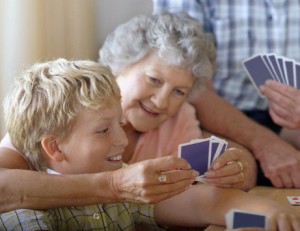Games for grandparents and grandchildren to play
Grandparents custody: what is it and why?
January 3, 2011Mistakes to avoid when seeking grandparents visitation rights
January 10, 2011 Playing with grandchildren is something every grandparent enjoys. For the child, play is an important part of childhood, developing thinking and reasoning skills, teaching social skills and building confidence.
Playing with grandchildren is something every grandparent enjoys. For the child, play is an important part of childhood, developing thinking and reasoning skills, teaching social skills and building confidence.
For grandparents, playing with grandchildren keeps them mentally and physically active. For the grandparent and child, playing develops family relationships and builds memories.
Games by Ages
Games for babies and toddlers are generally short and involve direct interaction between the grandparent and child. For infants, these games include peek-a-boo, itsy-bitsy spider, imitating animals, or walking around and naming things. Older babies and toddlers love these games as well, and they enjoy simple toys including blocks, balls, crayons, bubbles or sidewalk chalk.
Depending upon their age, games for school-age children include board games, card games and electronic games and jump ropes, playing catch and making mud pies. Grandparents can enhance learning skills, according to a Reading Rockets article, with word games, such as repeating nursery rhymes and leaving out a specific word or telling stories to each other. For grandparents who are active physically, badminton, croquet and throwing balls are fun outdoor games.
Budget-Minded Games
Games made from things at home are fun for children and good for the grandparent’s budget. Although infants don’t understand the concept of a full game, grandparents can play make believe with infants. Fill a lower kitchen drawer with plastic bowls, empty cereal or oatmeal boxes for babies, to allow impromptu musical games with “drums” using wooden spoons.
Other games with infants include peek-a-boo or This Little Piggy. Instead of tossing or donating old clothes, fill a box with clothes, shoes, hats, purses and costume jewelry for an afternoon of dress-up and makeup believe, ending with a tea party. Budget-minded games for older children include charades, hopscotch, homemade bubble solution and play dough. In simple games such as I Spy, the person who is “It” selects something in the room and guides the other people to it by saying, “Hot” or “Cold.”
Twenty Questions is another easy game, where the person who is “It” thinks of an item and the other person asks up to 20 yes-or-no questions to identify the item. Working a crossword puzzle together is fun for older children. For grandparents who don’t mind getting wet, a water balloon toss is a fun and cool way to spend a hot summer afternoon.
Time Frame
Some games can be played quickly, such as the card game, Slap Jack. A deck of cards is divided out equally among all players. Then everyone turns over one card at the same time in a discard pile, until a jack appears. Whoever slaps the jack first gets all the cards in discard pile. Play continues until everyone has used up the cards in his hands; the player with the most cards in his discard stack wins.
If a child is visiting for several days with a grandparent, a game that takes long time is enjoyable. The board game Risk can take days to play. Jigsaw puzzles can be left out on a card table until they are completed.
Benefits
Games develop thinking and speaking skills for babies and young children. For older children, board, card, and guessing games develop reasoning skills while physical games help develop stronger, healthier bodies for both the children and the grandparent. Playing between generations builds stronger family relationships. Playing allows for conversation between players; grandparents can share memories of their childhood or listen to the problems and successes of the child.
Distance
Even when distance separates grandparents and their grandchildren, there are still games they can play. Younger children can play guessing games or fill-in-the blank rhymes over email or web cams. Older children can arrange to meet their grandparents on Internet gaming sites and play a game of Spades while chatting about what has been going on in their lives.




1 Comment
(tadalafil) tadalafil tab https://tadalafilise.com/